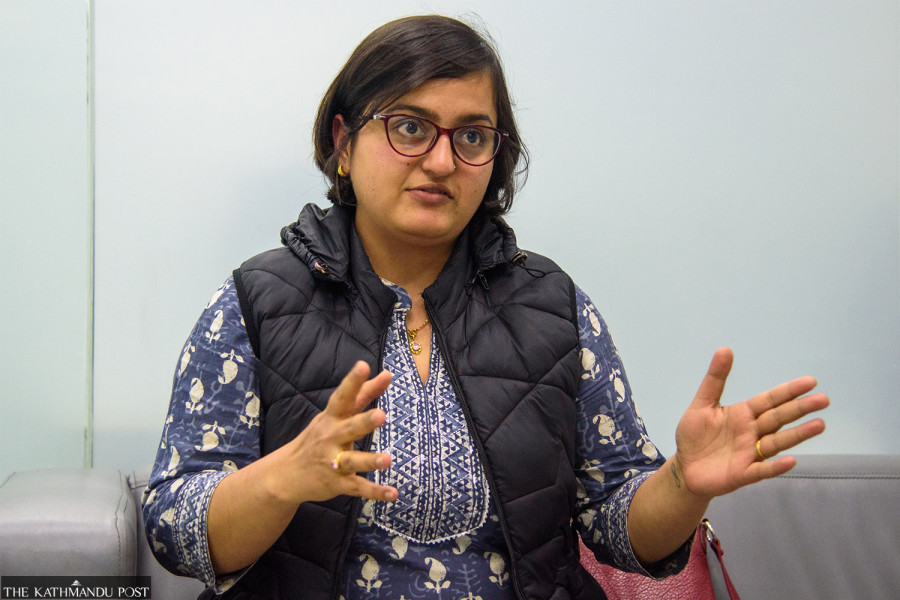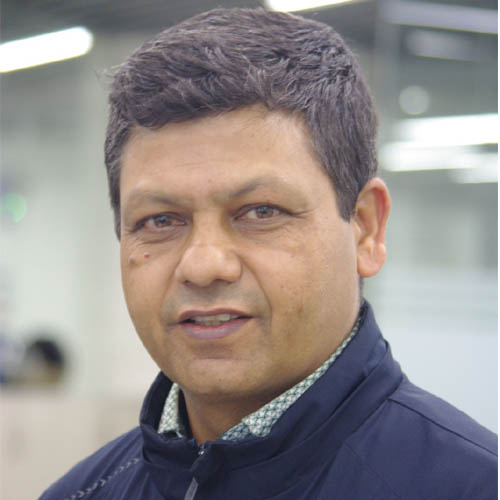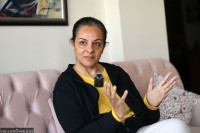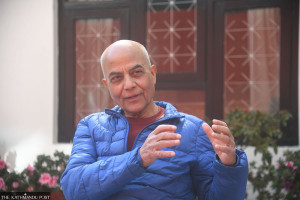Interviews
New forces grew from the seeds of alternative politics we sowed
We can’t rule out the possibility of party unity with new forces. We shouldn’t be rigid.
Thira Lal Bhusal
Once visible, vocal and different from traditional political forces, the Bibeksheel movement is now almost nowhere in national political scenarios. One of the key members involved in the movement was Ranju Darshana, who stole limelight after securing over 23,400 votes in the race for the Kathmandu mayoral seats in 2017, when she was just 21 years old. Now she is the general secretary of the Bibeksheel Sajha Party, which is led by Samikchya Baskota. The Post’s Thira Lal Bhusal asks Ranju Darshana what went wrong, why they didn’t succeed in reviving the movement, and if they have any new strategy to rejuvenate the organisation.
Bibeksheel Sajha Party is now almost invisible in Nepal’s political as well as social movements. What is it doing now?
The Bibeksheel Sajha Party is striving to reemerge in Nepali politics. The then Bibeksheel Nepali Party and Sajha Party united to form Bibeksheel Sajha Party in 2017. Some prominent personalities who were established in their respective sectors and a group of youths like us who groomed ourselves on the ground of social movements got united. We had expected that the synergy would give wonderful results. Unfortunately, it couldn’t happen. The unity couldn’t last long. It was the same point, people were disappointed first about our movement. Because many were expecting something different from a new group like us. We got confused too because most of us had no political background. In fact, we were politically naive. I don’t want to blame anyone for this. I would rather ponder within ourselves about what went wrong.
Ujwal dai [Ujwal Thapa] was the key figure to lead the movement in the initial stage. He had high standards on moral, integral and ethical aspects. He wouldn’t compromise on these core beliefs. But he also had no political background. We collectively decided to split the party. But it was widely criticised and many well-wishers wanted the two newly emerged forces to come together. We got reunified. But, again, we split. So, a series of unity and divisions embroiled us so badly that we couldn’t give time to the public. We were so much engaged in intra-party bickering that we couldn’t work on the pledges we made to the people. When we had to fight the November 2022 general elections, our party was in shambles. Some of us had to fight elections independently. Some of our friends fought under other parties’ election symbols, while others joined new parties.
Traditional politicians used to claim that the Bibeksheel Nepali Party wouldn’t sustain as it lacked an ideology and an orientation needed to thrive as a political organisation. You just mentioned that political naivety also caused the problem.
The political culture they were referring to was the tendency of getting unified in an organisation and embracing a strategy to reach power in whatever way possible. As far as the issue of political ideology is concerned, we were advocating that we wanted to establish a centrist force—not a leftist nor a rightist. We championed kalyankari loktantra (welfare democracy). We stood for constitutionalism. The same tenets are now discussed as political features. So, maybe we couldn’t properly convince the people at the time. We wanted to present ourselves as an alternative to traditional politics, but we couldn’t do so effectively due to intra-party wranglings.
If the infighting was to blame, why the remaining team couldn’t revive the party after Rabindra Mishra and his team left the organisation?
By that time, the organisation had already been in deep trouble. He was a party chair, but suddenly, he came up with a political idea that he described as ‘country above an ideology’. He abruptly tried to change the party’s political line. We came up with another political document to counter his idea. When we opposed it, he sacked us from the party. Now, we are gradually fixing the internal things and trying to give momentum.
Is it also because of Ujwal Thapa’s sudden death that you all are facing a situation like a leadership void?
His sudden demise has certainly caused a huge setback not only for youths like us but also for the entire movement of alternative politics. He, however, had already voluntarily sidelined himself from active politics. However, we were constantly in touch with him for his mentorship, and he guided us on important issues. He had already transferred the leadership to other leaders. So, we can’t have that excuse. We have to improve ourselves in many practical aspects.
When you two leaders, Samikchya Baskota as a chairperson and you as a general secretary, took the helm, it was widely welcomed, and people had high hopes. However, even after a year under the new leadership, we don’t find the party working as per that expectation.
Your observation is not wrong. This is my first time working closely with Samikchya Ji. Though we were at the same party for some time, we had no chance to collaborate. We are now trying to fix internal things gradually. The major challenge was to instil confidence in the friends as they were demotivated by the ups and downs they faced in the party within a few years. They were worried that a decade-long struggle wasn’t yielding any result. We are trying to convince them by saying that despite our failure to solidify our organisation, the country has seen alternative forces because of the seeds we sowed. It was the path that we created. We are now doing some planning and preparation, and we can show something in a year.
What are the new plans and agenda?
One of our focuses will be women in politics. We will try to work on the political rights of women and challenges in politics. We also want to create a mark on how an organisation led by women is efficiently run and can be different in its structures.
What type of composition in the party leadership have you created from gender perspectives after you two took the helm? Is your party significantly different from traditional ones?
Besides us, one vice-chair and a secretary are women. This is made mandatory by the party statute. Still, I can’t claim that our party completely differs from traditional ones. Therefore, we are planning some women-focused programmes and launching them in the next couple of months.
Do you think your pair can inspire young women?
First we have to turn our party into a vibrant organisation and show an inspiring graph of results until the next general convention. Once we can do it, they will follow us, otherwise they will not. So, we have to focus on our work.
How different is a pair of women leaders leading a party? Or gender doesn’t matter when it comes to leading an organisation?
It definitely matters. We are more empathetic to each other and to our team members. Our approach is that we first have to understand the members’ views before we make a decision. It’s not that we don’t have any differences. We do have differences on work styles and other things but we are very conscious that our differences shouldn’t affect the organisation because we know how leaders’ differences weakened the party in the past.
Is the difference between you and Baskota an ideological one?
We don’t have ideological differences. I had already become active as an independent and I wouldn’t have rejoined the organisation from the convention if there was an ideological difference. Our party statute is clear and follows the ideas adopted in the country’s constitution. The party convention may change something through due process, that’s a different aspect. But now we follow the statute and the constitution. We both agree on the same.
Many wonder why the young Ranju Darshana of 2017 gradually disappeared.
I think I haven’t disappeared. But it is true that we as a team failed to cash in on the votes and popularity that we gained at the time. We got lost in a series of disputes over party unity and divisions multiple times. Besides that, I was just studying for my Bachelor’s degree. Afterward, I completed graduation and also the master’s degree as well. The unnecessary and prolonged disputes not only crippled the party but also killed our time. So, we couldn’t work for the public. Therefore, I also tried to avoid the media because I myself wasn’t quite satisfied. I rather tried to understand issues in depth and make personal growth.
Also as an organisation, Bibeksheel’s main strength was its vocal presence on social and governance issues. Why did that activeness diminish drastically?
That’s a valid question. I don’t blame others. We should have managed that properly. But we have already started the process to resume that. As you know, I arrived here directly from a protest at Maitighar. As I was groomed in a background of social campaigns, I can understand it. We will resume it. One positive aspect is that we held multiple conventions and came up with political documents. So, we have learnt a lesson. Politically, we have become mature. Now we need to revive the campaign part.
New political forces have emerged very strongly. In this context, how can you regain your space?
I take their emergence positively. People know about our contribution in spreading positivity and something new in our society. In the past, we focused more on campaigns. Now we want to offer a solution as well. For instance, our party statute says Nepal needs a directly-elected head of the government for better delivery. Likewise, the lawmaker shouldn’t become ministers. It stops frequent making and breaking of coalitions and ensures one level of political stability.
Is there any possibility of your party going for unity with other new forces?
Party unity isn’t something that I can say anything on a personal basis. It has to be decided by the party. It depends on how things develop over time. If we get an official proposal, we should take it positively and hold talks. We shouldn’t rule out such possibility and be rigid against it.
Does your party have any policy differences with the Rastriya Swatantra Party? For instance, the RSP doesn’t want the provinces in the present form? What is your party’s view?
We are yet to hold a policy convention and make decisions on such specific issues. We will do it in future for more clarity. As of now, we are committed to democratic values and the three-tier federal system. They have expressed their reservation over provincial structure. But at the same time they are also forming the party’s provincial committees. So, there is some contradiction there. In other things, there are no significant differences.




 10.12°C Kathmandu
10.12°C Kathmandu



.jpg&w=200&height=120)








